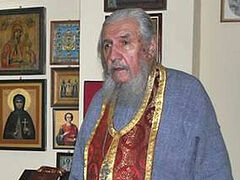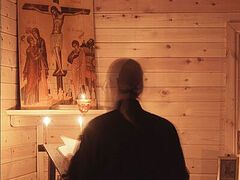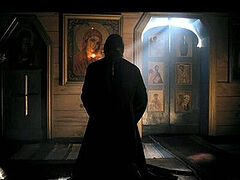We talked with Fr. George Maximov on a range of subjects—from the crisis of faith in our young people to criticism of the Church by “experienced theologians” and pastor “burn-out”. In his usual manner, referring to Patristic teaching, he calmly and clearly gave an answer to the burning question of the time: What is Church modernism? Are those who have an uncompromising attitude towards this phenomenon right? And is it possible to reconcile a modernist with the Church’s teaching, allowing criticism of some details of the teaching? But the main leitmotif of our conversation was the conviction that never before had there been so many favorable opportunities for confessing the Orthodox faith, for the whole life of an Orthodox Christian. In Fr. George’s (and not only his) view, we have been given this time through the prayers of the New Martyrs. And how important it is to live through this time with grace and gratitude to God!
The best time
 Priest George Maximov —In our times [in Russia], the Church and people in the Church have every opportunity for active preaching and missionary work. But this activity sometimes causes irritation in secular people. The world around us still remains “without understanding” and “without acceptance” of the word of salvation. Thirty years of church freedom have not softened the mores of our fellow-countrymen. Sometimes we hear that “the Church was given too much freedom”, “priests have become insolent, and they dare to teach us…” It would seem that we all live in the same society and have nothing to quarrel over. Why don’t we go back to our roots, think about our souls, our true spirituality, something greater than our usual daily activities and concerns?
Priest George Maximov —In our times [in Russia], the Church and people in the Church have every opportunity for active preaching and missionary work. But this activity sometimes causes irritation in secular people. The world around us still remains “without understanding” and “without acceptance” of the word of salvation. Thirty years of church freedom have not softened the mores of our fellow-countrymen. Sometimes we hear that “the Church was given too much freedom”, “priests have become insolent, and they dare to teach us…” It would seem that we all live in the same society and have nothing to quarrel over. Why don’t we go back to our roots, think about our souls, our true spirituality, something greater than our usual daily activities and concerns?
—Yes, I agree, our contemporaries have varying reactions to the message of Christ. But it has always been that way. Blessed Augustine spoke about this in his work, The City of God. Formulating the concept of two cities, he wrote that there will always be the city of the earth and the city of God—the former consists of those who wish to live according to the flesh, the other of those who wish to live according to the spirit. Of course, all this can be seen nowadays as well. But I can agree with you—we now live in a very favorable time for Christian life.
By some standards it is the best time in the history of our nation. Christian teaching has never been as accessible as it is now; it has never been so easy, and Christian books have never been so accessible as they are now… Earlier, it was more difficult to publish books, they were quite expensive, and not everybody could read. If we look deeper into the past, books were much more expensive (not to mention manuscripts, which often cost as much as whole villages). In those remote times one had to exert every effort to learn about the faith. Now you have plenty opportunities to learn. If you want to have faith—you are welcome; you are free to download materials from the internet and read them. If you don’t want to read, you can listen or watch. You have everything you need! If you want to pray, go ahead and pray! If you want to go to church services, you’re free to go!
Why have we been given this time? Frankly speaking, I don’t think it is because we are so good and our generation is better than the generations that lived before us.
When I studied and read the Lives of the New Martyrs who suffered in the twentieth century at the hands of the godless regime, in very many of them I saw the firm faith and hope that the persecutions would end and the Church would be reborn. And it became obvious to me that the Lord didn’t give us this time for our sake because “we deserved it”, but He did it for their sake—for the New Martyrs. That their hope and faith would not be put to shame! He fulfilled their wishes!
—All the more terrible it will be for us at the Last Judgment because we have no excuse, and didn’t make use of this favorable moment!
—Yes. Righteousness exalteth a nation: but sin is a reproach to any people (Prov. 14:34). Few people here look at the greatness of our nation from this perspective. They usually talk about material wealth, the might of the army, some external political matters, the economy and increasing prosperity… But no one thinks that the greatness of a nation is in its righteousness—and that’s how the Lord looks at it!
And, alas, few of our contemporaries choose the path of righteousness. Obviously, these people are clearly not the majority. Many, unfortunately, choose the path of lawlessness—I mean lawlessness from the perspective of the Law of God. And, of course, according to the Word of God, it brings misfortune upon people!
What is the result? Doesn’t the Lord see that we are choosing this path? I am speaking not only about the externals, but also about those who consider themselves “Church people.” Is it possible that, looking at all this, the Lord would say: “They deserve better. I must give them even better conditions”? To be honest, I am afraid that the Lord will draw completely different conclusions!
So we must be grateful for the time we have now. We must give thanks to God for the opportunities of Christian life we have! And we should take advantage of them while it is still possible.
On hatred for Christ and “protest” Christianity
—Here is a simple example: The Vigil is being celebrated on Saturday evening in a small church, but right near it there is music blasting; people are screaming, and smoking hookahs … I often think, these young people can hear the singing coming from the church, the sounds of the service, the ringing of the bells. They are not stupid (and not as indifferent as they seem to be); they understand that the Divine service is going on very nearby, and what they are now immersed in is in no way compatible with it! And if we recall the time of the New Martyrs, will none of these young people think why people were once persecuted for their faith alone, arrested only for attending churches and wearing crosses around their necks? Why oppose the Church in such a shocking way today? If you don’t believe, there’s no need to demonstrate your unbelief so pointedly and in such a contrary way to the Church and faith… There is a demonstrative rejection of holiness! And you see this in one form or another quite often today. Do you agree with me?
—Certainly! But there are different reasons behind this. To start with, there is a smear campaign against the Church (and Christianity in general) in the media and on the net. And it has been going on for several years. Of course, it has its effect. You have talked about Russia, but what’s going on in Greece! Believe me, in Greece secular society has always been more committed to the Church than ours. The Church actually saved the Greek nation during the Turkish occupation, and the authority of the Church there was very high until the 1990s. And then, cautiously (of course, all this was not directly expressed) criticism, ridicule and defamation began, and then more and more. And this had its effect—today Greeks, including Greek youth, treat the Church more coldly. And no wonder! Imagine that you have been told only bad things about someone for twenty-five years on end! Even if you resist it, even if you disagree, it still leaves a nasty aftertaste. But many don’t oppose it—they want to believe it!
This is the first point. The other point is spiritual. When a person chooses sin, he inwardly feels the opposition to holiness. This is what triggers the reaction you are talking about. And people themselves often don’t understand this.
Look at atheists, with what hatred some of them speak of Christ and the Church! This can’t be explained merely by unbelief. For instance, I don’t believe in Buddha, but I have never had the desire to mock him and his followers constantly and devote as much time to this as some atheists devote to their struggle against Christianity. And, interestingly, atheists don’t display such an attitude to Buddha or Mohammed. Let’s suppose that they are simply afraid to express their attitude towards Mohammed. But what about Confucius, Lao-tzu and others?... Anyway, you won’t find in them such an obsessive and burning animosity against anything as they what have towards Christ!
—Why?
—Because it’s Christ Who cuts them to the quick. Sometimes, seeing their hatred, I think, what exactly has Christ done to you that’s so bad? I could understand why you hate priests, say, such as me. But what wrong has Christ done to you? But it is Christ Whom they hate, because they sense His holiness. Their conscience often denounces them, and in order to stifle its voice they turn on the spiritual mechanism that you have mentioned.
The evil spirits are not sleeping either. If a person still hesitates and doesn’t know what to believe, they push him in a certain direction and stealthily send him particular information.
True, humanly speaking, it’s a pity that many find themselves in this environment. But everything that the Lord sends us is for our benefit. And it seems that the fact that Christianity is ceasing to be fashionable (especially among young people) is also for some benefit. As a result, people will come (and are already coming) to the Church who aren’t doing it for the sake of fashion and tradition. They really believe in God and are really convinced that all this is necessary for their lives and salvation.
Maybe some other fruits will come from this, we can think about it. But the Lord allows everything for a specific purpose—including the current situation.
—The next question is about human pride. I may be mistaken, but it seems that today the State regards the Church as something glorious, great, triumphant, as its ideological support or something. Recently we have experienced the feeling that the Church is called to support the institution of the State: magnificent churches, solemn services, which are sometimes attended by prominent politicians and heads of State. This Church is needed and, most importantly, understandable. But if we consider the teaching of the Church, its inner life, discipline, then, according to the Savior, it is foolishness for the world. And young people certainly don’t want to be “insane”, “foolish” (much less modest, humble and pious) in this world, right?
—Actually, the theme of protest is close to young people and they would love the concept of protesting against sin, against the path the whole globe has taken… if the Church didn’t also offer humility. Humility is a very difficult thing. Some Orthodox people are so interested in accusation, the search for enemies, exhortation and denunciation, that this naturally turns into delusion.
But even a “protest” position like this doesn’t appeal to many because you just can’t expose sins if you are devoted to them. You first need to reject them—and very few are capable of this.
Therefore, even despite the propensity toward protest in some young people, this will not be what will attract them to Christianity. Christianity should be attractive because of the Lord Jesus Christ! His teaching, His Church, the path of salvation and union with Him!
It is important not to lose prayer!
—It seems that in our days we often forget that our main Christian work should be prayer. But when we talk about prayer, we vaguely imagine what prayer work is like, how you can live with prayer, practice prayer, and perform a prayer rule… We only know how to read prayers. When we read about ancient monasticism—for example, about St. Sergius of Radonezh—we can hardly imagine how monks of those times lived, how services were celebrated. We are accustomed to “being” at church services, but how to actually live the service—to contemplate prayerfully and pray to God—is perhaps not given to everyone to understand?
—To tell the truth, I can’t say about myself that I am “a man of prayer.” But even from my very modest experience I can say that it is very important not to lose prayer. After all, it is regular prayer that the devil is trying to steal from modern Christians.
When modern Christians lose regular prayer, it is much easier to do everything else with them (for example, to get them involved in some sins). That’s why it is vital not to lose prayer and to begin and finish every day with it. The Church gave us the prayer rule for our benefit so we can learn to pray—what to speak about to God, how to pray and what to pray about. We should learn to pray regularly.
In addition, the rule is also important that we may not forget to add something personal when praying to the Lord. It will take just a few seconds, for example, at the end of the day. If there was something good during the day, thank God in your own words; if there was some trouble or difficulty, ask God for help; if you committed a sin, repent. You will also need to go to confession, but on this day it is important to testify before the Lord that you don’t consider what you’ve done to be normal. If you are worrying for somebody, pray for him… It will take a few seconds, but I think this personal calling on God will help you not lose the feeling of your living communion with Him.
On masks and the pandemic, again
—The podvigs that people in the past performed out of love for God, Christ, and the truth are not seen today. When you read about something like that, it seems it was long ago, not with us, and it is impossible for us to perceive it. Today a lot of problems, including Church issues, are discussed in electronic media, blogs, videos and chat rooms. Many try to get some instructions, spiritual consolation there. We have experienced this especially during the pandemic. Some have come to the conclusion that it is not necessary to go to church—you can be involved in spiritual life through TV or the computer. Fr. George, we would be glad to hear your opinion.
—What has been done because of the coronavirus (closing churches, live-streaming services) is an exceptional measure, and it has never been positioned by our Church hierarchy as some kind of new norm. It was caused by the extraordinary circumstances.
In fact, no one knew what their reaction should be. It was an absolutely new situation for everybody—for the Church hierarchy, the government, ordinary people and all of us. Nobody knew what to do with it. And under those circumstances, imperfect decisions can be made. Maybe the same people would have acted completely differently now.
Whatever was done is done. We should be wise here and understand that our government and Church hierarchy are human and have the right to make mistakes, and someone might consider their decisions to be wrong. Opinions vary. Some believe that no mistakes were made at all. This is a separate topic and I don’t want to go into now detail. But I’d like to answer those who were confused. Even if you consider it a mistake, why not forgive it? Why not think about the fact that we are all human? The Lord forgives you your mistakes. You bewail them, then go to confession and ask the Lord to forgive your mistakes, after which the priest grants you absolution.
Recently a man snowed me under with letters that wearing masks is a sin. I am personally not keen on wearing a mask, but when I hear that it’s a sin, then, forgive me: Which commandment is violated this way? What is sinful in this? The man writes, “It’s a sin because we conceal the image of God in this way!” But that’s heresy! Is our face an image of God? It certainly isn’t! Read about what the image of God is in man—it’s not our face! So, which commandment is violated here? There is no commandment that states, “Thou shalt not cover your face!” We may not like masks, sometimes we may make some other decision, but to regard those who wear masks as sinners is a sort of delusion in my opinion!
—All the more so because everyone has the right to care about their health and to be afraid of the virus.
—Certainly!
—I hope that consequently we will all view the situation we have found ourselves in due to the pandemic somehow differently, because, indeed, humanity has never experienced anything like this.
It was perceived by many as a disaster because it swept the whole globe at once.
To be continued.





